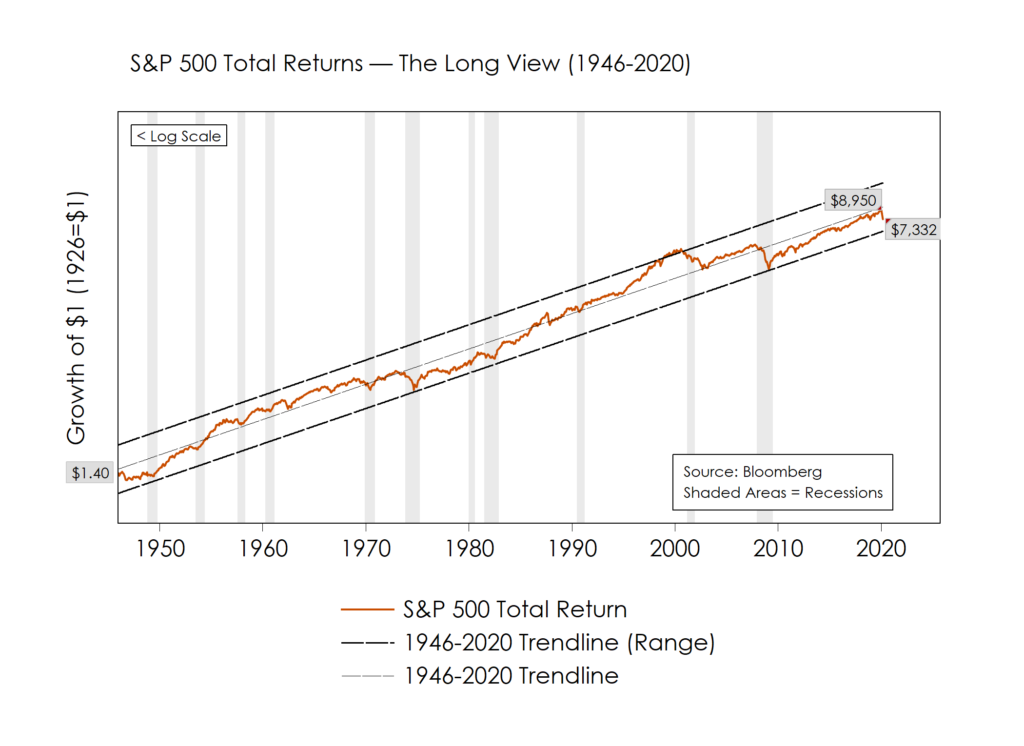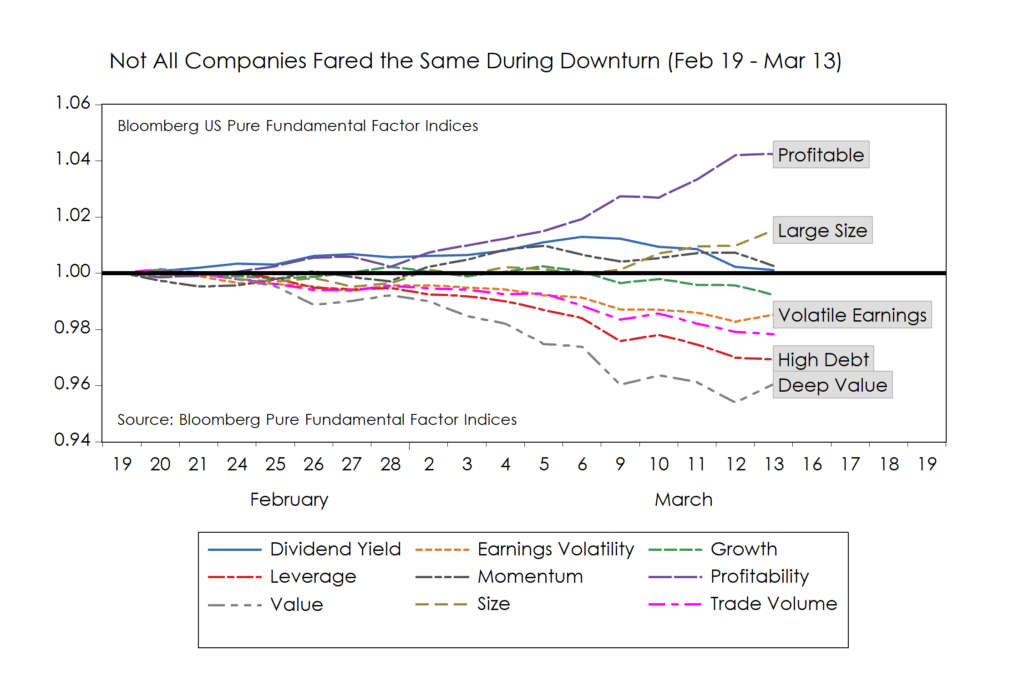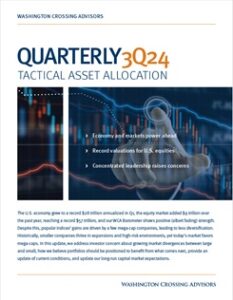Perspective on Market Conditions

An eruption of volatility hit markets last week as the World Health Organization declared Covid-19 a pandemic. This extraordinary outbreak will throw out of kilter many aspects of daily lives. Markets are rapidly reestimating risk and trying to predict the size and duration of the shock to the global economy. Central banks and governments are also stepping up response to unfolding conditions. Yesterday, the Federal Reserve cut their benchmark interest rate by 100 basis points (-1.0%) to a range of 0-0.25%, committed to buying $500 billion of U.S. Treasuries and $200 billion of mortgage-backed securities, and took other measures to support the flow of credit. While this may not be enough to forestall a sizeable hit to growth in the first half, the support of central banks is essential to maintain the proper functioning of credit and interbank markets.
Volatility is Not Risk
When markets are volatile, it means that they tend to make big moves up and down, which makes trading volatile markets hard to do. The past week’s extreme volatility reached levels not seen since the end of the last bear market in February 2009. The rapid onset of the coronavirus, coupled with a sudden and unexpectedly significant oil price drop, led to a brisk 20% equity market drop and erased $13 trillion from global equity values in recent days. This sharp re-rating of prospects happened much faster than analysts could respond. Since February, analysts have only cut U.S. corporate earnings forecasts 2%.
The speed of the market correction coupled with a near-record spike in volatility makes selling at this stage of the game tricky. We believe it is far better to maintain a long view, focus on quality, and stick to a consistently applied investment plan than engage in short-term trading.
A Matter of Perspective
As this new challenge unfolds, the commonness of everyday life is disrupted. New patterns of living, working, and communing are starting to emerge. But adaptability, the great and essential strength of our society and markets, was the key that enabled past setbacks of all kinds to be overcome. Each test, recession, and bear market proved painful but temporary and eventually gave way to renewed growth and greater prosperity (chart, below). This episode should prove no different.

Not All the Same
Since February 19, the U.S. equity market has declined by over 20%. Such a decline qualifies as a “bear market.” Yet not all stocks were harmed to the same degree (chart, below). Highly leveraged companies, popular stocks, deep value stocks, and those with uncertain earnings suffered the worst damage. Profitable, low-debt, consistent, and larger firms held up better. We continue to recommend that investors focus on quality and consistency over high yield, deep value, and rapid growth.

Conclusion
The maintenance of perspective is the investing imperative of singular importance during volatile markets. Recent days, and likely the days and weeks ahead, will be a time of volatility and opportunity. We believe Washington Crossing Advisors’ strategies are well-positioned to take advantage of evolving market conditions. We will stick to our knitting and continue the hunt for the best values among the highest quality companies we can find.
Kevin Caron, CFA, Senior Portfolio Manager
Chad Morganlander, Senior Portfolio Manager
Matthew Battipaglia, Portfolio Manager
Steve Lerit, CFA, Client Portfolio Manager
Suzanne Ashley, Analyst
(973)
549-4168
www.washingtoncrossingadvisors.com
www.stifel.com
Index Definitions
Bloomberg US Pure Factor Indices – The Bloomberg US Pure Fundamental Equity Factor Indices represent the return of various fundamental factors from Bloomberg’s U.S. Equity Fundamental model. Fundamental factors include leverage, value, momentum, growth, volatility, size, dividend yield, earnings variability, and trading activity.
The Standard & Poor’s 500 Index is a capitalization-weighted index that is generally considered representative of the U.S. large capitalization market.
Disclosures
WCA Fundamental Conditions Barometer Description: We regularly assess changes in fundamental conditions to help guide near-term asset allocation decisions. The analysis incorporates approximately 30 forward-looking indicators in categories ranging from Credit and Capital Markets to U.S. Economic Conditions and Foreign Conditions. From each category of data, we create three diffusion-style sub-indices that measure the trends in the underlying data. Sustained improvement that is spread across a wide variety of observations will produce index readings above 50 (potentially favoring stocks), while readings below 50 would indicate potential deterioration (potentially favoring bonds). The WCA Fundamental Conditions Index combines the three underlying categories into a single summary measure. This measure can be thought of as a “barometer” for changes in fundamental conditions.
The information contained herein has been prepared from sources believed to be reliable but is not guaranteed by us and is not a complete summary or statement of all available data, nor is it considered an offer to buy or sell any securities referred to herein. Opinions expressed are subject to change without notice and do not take into account the particular investment objectives, financial situation, or needs of individual investors. There is no guarantee that the figures or opinions forecasted in this report will be realized or achieved. Employees of Stifel, Nicolaus & Company, Incorporated or its affiliates may, at times, release written or oral commentary, technical analysis, or trading strategies that differ from the opinions expressed within. Past performance is no guarantee of future results. Indices are unmanaged, and you cannot invest directly in an index.
Asset allocation and diversification do not ensure a profit and may not protect against loss. There are special considerations associated with international investing, including the risk of currency fluctuations and political and economic events. Investing in emerging markets may involve greater risk and volatility than investing in more developed countries. Due to their narrow focus, sector-based investments typically exhibit greater volatility. Small company stocks are typically more volatile and carry additional risks, since smaller companies generally are not as well established as larger companies. Property values can fall due to environmental, economic, or other reasons, and changes in interest rates can negatively impact the performance of real estate companies. When investing in bonds, it is important to note that as interest rates rise, bond prices will fall. High-yield bonds have greater credit risk than higher-quality bonds. The risk of loss in trading commodities and futures can be substantial. You should therefore carefully consider whether such trading is suitable for you in light of your financial condition. The high degree of leverage that is often obtainable in commodity trading can work against you as well as for you. The use of leverage can lead to large losses as well as gains.
All investments involve risk, including loss of principal, and there is no guarantee that investment objectives will be met. It is important to review your investment objectives, risk tolerance and liquidity needs before choosing an investment style or manager. Equity investments are subject generally to market, market sector, market liquidity, issuer, and investment style risks, among other factors to varying degrees. Fixed Income investments are subject to market, market liquidity, issuer, investment style, interest rate, credit quality, and call risks, among other factors to varying degrees.
This commentary often expresses opinions about the direction of market, investment sector and other trends. The opinions should not be considered predictions of future results. The information contained in this report is based on sources believed to be reliable, but is not guaranteed and not necessarily complete.
The securities discussed in this material were selected due to recent changes in the strategies. This selection criteria is not based on any measurement of performance of the underlying security.
Washington Crossing Advisors LLC is a wholly owned subsidiary and affiliated SEC Registered Investment Adviser of Stifel Financial Corp (NYSE: SF).



